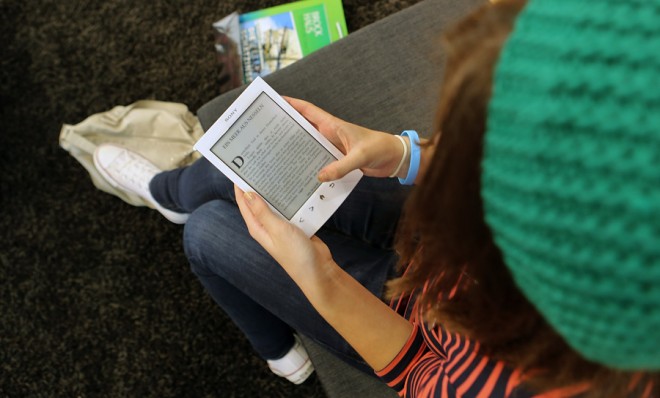Why e-book sales are starting to fizzle
The market could use another Hunger Games

A free daily email with the biggest news stories of the day – and the best features from TheWeek.com
You are now subscribed
Your newsletter sign-up was successful
Here's a surprise for anyone who thought e-books were here to bury print:
A report from the Association of American Publishers says sales of e-books rose just 5 percent in the year ending in the first quarter of 2013, a big drop from the year earlier when sales grew 28 percent, and an enormous drop from two years ago, when sales jumped a crazy 252 percent.
E-books now represent 25 percent of total book sales, a big chunk considering they've only been around in earnest for about six years. But it's still a long way from the kind of dominance feared by die-hard print fans who wistfully extol the smell and texture of dead trees — not to mention book publishers and book sellers.
The Week
Escape your echo chamber. Get the facts behind the news, plus analysis from multiple perspectives.

Sign up for The Week's Free Newsletters
From our morning news briefing to a weekly Good News Newsletter, get the best of The Week delivered directly to your inbox.
From our morning news briefing to a weekly Good News Newsletter, get the best of The Week delivered directly to your inbox.
In a recent blog post, author Nicholas Carr lays out six possible reasons for the fizzling growth. Among them: We misjudged the advantages and disadvantages of the two types of books, and e-book prices haven't fallen low enough to capture the market. His favorite explanation, however:
The shift from e-readers to tablets is putting a damper on e-book sales. With dedicated readers, pretty much the only thing you can do is buy and read books. With tablets, you have a whole lot of other options. (To put it another way: On an e-reader, the e-reading app is always running. On a tablet, it isn’t.) [Rough Type]
Ezra Klein of The Washington Post prefers the theory that e-books are actually more akin to audio books — a compliment to print, not a replacement.
If you’re someone who reads a book every week during your commute, say a detective novel or romance novel, the e-book format is perfect for you. But those people have pretty much all shifted to e-books, and there are only so many of them. If you read a book of serious nonfiction a month at home, and maybe even put it on your shelf afterward as a bit of a trophy, printed books are pretty darn good. [The Washington Post]
It's worth noting that a separate study by Nielsen, which came up with similar figures as the AAP, attributed some of the slowdown to a fall in digital children's books, and particularly "to the lack of a star performing title in children’s and young adult publishing in 2013 to replicate the success that Suzanne Collins’ The Hunger Games trilogy enjoyed last year," says Publishing Technology. Nielsen also thought the incredible success that The Hunger Games enjoyed in 2012 "may have been a one-off event that helped to skew expectations of the market this year."
Nate Hoffelder at Digital Reader says the crazy double- and triple-digit growth was unsustainable, anyway. "In spite of the spectacular growth of ebooks in 2008 to 2011, we all know that eventually the ride would come to a stop as the growth of ebook market share slowed," he says. "I didn’t expect it to happen so quickly."
A free daily email with the biggest news stories of the day – and the best features from TheWeek.com
Carmel Lobello is the business editor at TheWeek.com. Previously, she was an editor at DeathandTaxesMag.com.
-
 Switzerland could vote to cap its population
Switzerland could vote to cap its populationUnder the Radar Swiss People’s Party proposes referendum on radical anti-immigration measure to limit residents to 10 million
-
 Political cartoons for February 15
Political cartoons for February 15Cartoons Sunday's political cartoons include political ventriloquism, Europe in the middle, and more
-
 The broken water companies failing England and Wales
The broken water companies failing England and WalesExplainer With rising bills, deteriorating river health and a lack of investment, regulators face an uphill battle to stabilise the industry